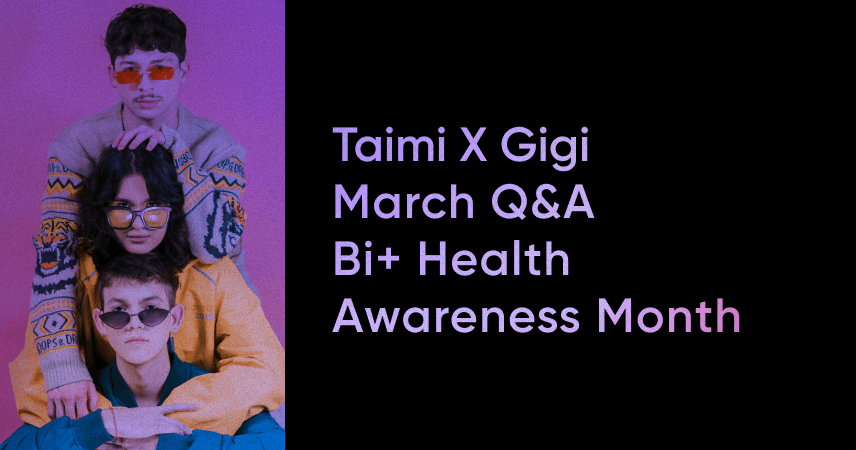Taimi X Gigi: March Q&A Bi+ Health Awareness Month

Gigi Engle is a certified sex and relationship psychotherapist specializing in Gender Sexuality and Relationship Diversity (GSRD). She is an investigative journalist covering sex and relationships and is the author All The F*cking Mistakes. Gigi’s work regularly appears in many publications including Cosmo, Glamour, Men’s Health, and Refinery29. Follow her on Instagram and Twitter at @GigiEngle.
Q: Bisexual men: Preparing to top/bottom for the first time. Checklist and what to expect?

If you’re preparing for anal sex for the first time – whether topping or bottoming – you want to get clear on the anal sex basics. This will ensure that both you and your partner are on the same page and can have the most pleasurable and enjoyable experience possible.
You want to consider the Big 5: Safety, anal prep, gear, speed, and emotional safety. You got this, bi guys!
Checklist
Safety.
-
Make sure you’re up to date on your STI screenings – and check in with your partner’s status as well. If you’re having sex with multiple sex partners, it’s recommended that you get tested after every new sexual partner. This ensures that you’re at the lowest risk of passing or contracting an STI.
-
Whether you’re giving or receiving, it’s a good idea to get on PrEP. This preventative medication stops the spread of HIV – even if you’re using condoms, it’s still a good idea!
-
Use condoms. Barrier methods are very effective at preventing the spread of STIs.
Get prepped for anal.
-
To douche or not to douche?, that is the question. This is entirely a personal choice. You definitely do not have to douche if you don’t want to. If you decide you do want to douche, Future Method has an amazing guide for beginners.
-
Make sure your diet has plenty of dietary fiber – or take a supplement! This ensures that you have solid poops, which will prevent mess during anal sex. It is what it is, folx!
-
I know that the idea of a poop situation isn’t sexy, but poop happens. We’re talking about the butt hole, after all. If you’re not prepared to deal with at least a little poop … you probably shouldn’t be having anal!
Have the right gear.
-
Get a reliable silicone lube. The anus doesn’t lubricate in the same way as a vagina does and therefore, lube is an absolute must. The more, the better!
-
If you’re interested, you can also get yourself a small butt plug – which can be great for warming up the anus before inserting a penis. The anus is composed of muscles and it needs to be warmed up and stretched properly to accommodate larger objects. Don’t worry though – it will return to its normal shape.
-
Anal dilators can also be a great way to get the bum prepped for anal sex. They graduate in size so you can slowly build up to taking larger objects.
Go slowly.
-
Don’t go full on immediately. Take time to warm up and relax the anus. I recommend practicing anal penetration on your own before doing it with a partner. This way you can get used to the sensations.
-
If something feels painful or hurts – stop! Anal penetration should NOT hurt. When you go slowly, relax the bum, and take deep breaths, it might feel strange at first – but it shouldn’t be painful.
-
The bottom is in control! The person being penetrated should be controlling the speed and depth. Always communicate throughout and if something doesn’t feel right, take a break and check in.
Check in with your emotions.
-
This is your first time exploring with another penis-owner in this particular way – it’s OK to be nervous! I’d definitely recommend being open and honest about your experience level with your partner. I know that can be daunting, but most people want you to feel secure and to have a good time.
-
Be sure the person you’re having sex with is someone you trust. I’m not saying that you have to be a serious partner, but they should make you feel seen and safe. If you don’t feel safe, this isn’t someone you should explore anal with – because, frankly, when it isn’t done correctly, it can be dangerous.
-
Have an aftercare plan in place. This can look however you want it to look – but being able to check in and touch base after a new sexual experience can really help you feel contained and grounded in the experience.
Q: Safe sex for two vulva owners? Dental dams…. how necessary are they? How to practice safe sex with toys?

Listen up, my beauties. Just because you are two vulva owners does not mean you cannot contract STIs. You absolutely CAN. So, we need to be cautious.
First, check in with everyone’s STI status. If someone has an STI (like the herpes virus), how are they managing it? Fun fact: You’re less likely to get herpes from someone who is herpes positive and is receiving proper treatment than someone who doesn’t know their status. Make sure everyone is on the same page so each of you can determine the risk you’re willing to engage with. STIs happen and they don’t deserve the stigma they get. With that being said, avoiding them is still preferable.
Second, dental dams can be really great to prevent STIs, especially those that are passed by skin-to-skin contact – like HPV and herpes. You can also pop on a pair of latex gloves to touch a vulva – which are actually pretty kinky and hot, if you ask me. Just like condoms, dental dams help reduce the spread of STIs. I definitely recommend them – especially if you don’t know the STI status of your partner. Only you and your sexual partner get to decide the level of risk you’re willing to engage in – so if you both decide you don’t want to use dental dams, that’s entirely your decision. What’s important is that everyone is on the same page, has all the necessary information to make informed choices, and feels safe.
Lastly, sex toys. If you’re washing your sex toys thoroughly with soap and water between every single use – and they are made from body-safe, non-porous materials, you’re unlikely to spread an STI to a new partner. But, if you want to be extra careful, pop a condom over your favorite vibrator or dildo. It actually makes cleaning up a lot easier, too.
Q: What mistakes to avoid and how to practice safe MMF and MFF threesomes?
Firstly, sure everyone is on-board and enthusiastically consenting to any and all sex positions and acts you’re going to try. If it isn’t a HELL YES, it’s a no. Check in periodically with all parties to be sure everyone is having a good time. A simple “does that feel good?” or “Do you like that?” can go a long way. Communication is key.
When looking for people to have a threesome with – or if you’re a couple looking for a third – using a dating app like Taimi can give you better access to people who share similar sexual interests. If you’re in a couple, write your bio together, being clear about what you’re looking to get out of the experience. When it comes to sex, you do not want to be sketchy or cagey about what you’re after. Be truthful and you’ll be rewarded.
No matter what kind of sex you’re having, all partners should be able to provide recent STI screening results. In addition, using barrier methods (such as condoms and dental dams) can help to prevent unplanned pregnancy and STIs. Be sure that condoms are changed after every single sex act, as cross-contamination can lead to the spread of STIs. It’s important to get a long-lasting, high-quality lubricant to make sure sex is comfortable and pleasurable. Lastly, do not go from anal penetration to vaginal penetration. This can lead to bacteria from the anus being transferred to the vagina, which can lead to the spread of STIs as well as vaginal infections.
Thorough communication and explicit consent is needed before you engage in a threesome. Even if you pick up a third at a bar (or are the third at the bar), you need to express your needs, wants, hopes, and fears for this particular experience. It’s not a good idea to fumble your way through group sex, especially as a newbie. You may wind up with a personal boundary crossed. It’s essential to understand — without question — what works and doesn’t work for all individuals involved before getting into bed. Having something happen that you weren’t expecting or aren’t into is an instant mood killer – and can even be traumatizing.
There is what threesomes look like in porn, and then there is real life. The two deviate substantially. Screw what society tells you threesomes should be like, and take the time to think about what you really want. It can be helpful to act like your own erotic movie director. Take some time to create a list of things you want to experience or how you want things to go. It’s really helpful to fill out a ‘sex menu’ or ‘red, yellow, green’ list detailing what you really want, what you are curious about, and what is a hard, ‘no.’ The clearer you are about what it is you want and like, the easier it is to plan ahead and communicate with your partners.
Figure out how everything is going to play out. Are you going to have drinks or dinner first? Will they be sleeping over? Will you be getting them an uber? Remember that every single person involved is there to have their fantasies and desires met. it isn’t only the main couple’s (assuming there is a main couple) interests that are important. Everyone deserves to be treated with respect, even when the fun is finished.
Get clear on an aftercare plan – this is another thing that should be predetermined before the ménage à trois. Aftercare is the way in which we take care of our partners after intense sexual experiences. This can range from cuddling, to massage, to being totally left alone, and anything in between. Discuss with the group to determine the aftercare each person needs so everyone feels comfortable and emotionally well.
Q: Does the importance change on taking Prep if you are a bottom or a top? How worried should bi ppl be about HIV? What is HPV and how is it treated? How many people have oral herpes and don’t know it?
Wow! That is a lot of complex questions rolled into one – so, let’s break them down.
If you’re having sex with multiple partners – whether you’re topping, bottoming, having anal sex, vaginal sex etc., I always recommend getting on PrEP. It drastically reduces the risk of contracting HIV. Speak to your healthcare provider about your options – or go to your local health clinic. It is very worth it for peace of mind and protecting your health. PrEP is not just for gay and bi male-bodied folx. It is for everyone. If you’re having casual sex, you should be on prep – regardless of your gender, sex organs, or who you’re having sex with. It’s just the smart choice.
HIV cases are on the decline, but that doesn’t mean we can just have a free-for-all and hope we won’t contract it. If you’re on PrEP, you’re safe from HIV. But if you’re having casual sex, yeah, you should be worried about HIV and should be taking proper precautions to avoid transmission. Stay safe out there, my dudes.
HPV is the Human Papillomavirus. According to the CDC, 79 million Americans are currently infected with HPV and 14 million people become newly infected each year. Eighty-five percent of sexually active women will contract one form or another of HPV in their lifetime. Harmful strains of HPV can cause genital warts, cervical cancer, anal cancer, and oropharyngeal cancer (cancer of the throat and mouth). HPV is passed through skin-to-skin contact and is very, very difficult to avoid if you come in contact with it.
There is a common misunderstanding that women and vulva owners are the only people tested because male-bodied people are merely carriers of the virus. This is not the case. While women and vulva owners are the ones tested for HPV and are by far at the highest risk for developing cancer (cervical cancer). There are 5,000 HPV related cancers in men and male-bodied people, of which about 80 percent are in the mouth and throat, 15 percent in the anus, and 8 percent in the penis.
Most cases of HPV clear up on their own – but it’s VERY important to get vaccinated to avoid cervical cancer and other forms of cancer. You won’t know if you have HPV unless you have an abnormal Pap test – which are only given to vulva owners. As the virus usually clears up on its own, there is currently no treatment for HPV.
After age 30, if an HPV test comes back positive for high-risk HPV, but the Pap smear is normal, the doctor will usually have the patient return in a year for repeat screening to see if the HPV infection persists and whether any cell changes have developed that need further follow-up testing. After that, they may do a biopsy to further test cervical tissue.
The best prevention: Get vaccinated.
Q: Some individuals identifying as single and bisexual are in search of a partner of any gender who is open to multiple partners in the bedroom. How can one address this directly without coming across as “sex-crazed”?
We really need to do away with this whole notion of being “sex-crazed” just because someone is sexually adventurous. It’s super dehumanizing and patronizing. And we are over it! There is absolutely nothing wrong with wanting to experience sex with multiple partners in the bedroom – whether single or in a relationship(s). This is a normal and healthy form of sexual expression.
The best advice I can give is to find community in the sex-positive space. An app like Taimi is great for finding like-minded people and groups where you can feel safe to explore your sexuality without the fear of judgment. You can go to parties, meetups, and hang outs with others who are open to the kinds of sex you’re looking to have – which can make actually going after those experiences a lot less scary and intimidating.
Be straightforward and honest with potential partners about what you’re looking for. If someone is rude or shames you, they are not your person! Obviously, it sucks to hear disparaging words being slung at you – but that is entirely a reflection on the person doing the slinging, not you.
And remember, just because you want to have exciting sexual experiences does not mean you’re not worthy of love or commitment. Lots of people want to find partners and still be able to explore their sexuality. Go find your people!
You are perfect just the way you are – and if you’re being open, honest, and communicative with partners and potential partners, you’re doing everything right. Don’t let some a-hole dim you sparkle.
Q: There is a lot of conflicting information, but is hypersexuality a genuine phenomenon? If so, is it primarily influenced by trauma, genetics, or a combination of both? How can someone work towards healing from it, since it could be overwhelming and cause risky behavior?

OK. There is literally absolutely no scientific evidence AT ALL that hypersexuality exists and we need to throw this term in the bin immediately. There really is no “normal” when it comes to libido. Our society tends to demonize women and AFAB people who have higher libidos. Women and AFAB folx who enjoy sex are regularly painted as “hypersexual” or “nymphomaniacs” – their sexuality demonized for being higher than their (usually cis-male) partner. This is damaging and needs to stop.
These terms aren’t just unhelpful, they are actively harmful. When we paint others or ourselves with pathologizing labels like “hypersexual” or “sex addict,” we are immediately cast into the realm of shame and dysfunction. Sex addiction is not a term recognized by either the DSM or the ICD, the US and UK’s diagnostic manuals, respectively. The evidence is simply not there to support this as a diagnosis. We need to do more embracing of ourselves, and less shaming.
The ways in which we view our high desire for sex has a lot to do with our beliefs about sex and our core values. If someone enjoys having lots of sex, making lots of sexual connections, and is having a great time – that is completely valid and can work for us. On the flip side, if we have negative views of our high sexual desires, it may cause us to believe there is something wrong with us. This can be highly damaging to our self-esteem.
Libido is only ‘too high’ if it’s negatively impacting your life. There is no measurable level of arousal that could ever be scientifically defined as “too horny.” That’s just nonsense. With that being said, a high desire for sex may cause distress – and if it is, that should be addressed and unpacked.
Basically, if being horny is making it impossible for you to do your job, concentrate on anything else, or keeping you from engaging with friends and family, it might be an issue worth exploring. Keep in mind that this isn’t the case for the vast majority of high libido people. Most people with a high libidos are perfectly capable of going about their normal lives – only with a more robust sex life (either partnered or solo).
And look, “out of control sexual behaviors” can happen for some people but, they are highly treatable with a skilled practitioner who knows how to work with individuals in a non-pathologizing way, focusing on nervous system regulation, rather than shame-based models like 12-step programs, which are not the evidence-based way to treat this issue.
One of the most gorgeous things about being human is that there is no “normal.” What is normal for you is entirely subjective and will depend on your own mental state and experiences. Having a high libido can feel stressful – especially if your partner has a lower libido than yours, but that does not mean that there is anything wrong with having a high libido.
The sooner we embrace the horn and accept ourselves, the better.
Q: How do you recover from the physical and mental exhaustion from intercourse and other sexual deeds?
This is such a fun one! Sex CAN be very tiring – both physically and emotionally. And this is totally OK and normal. Here are some ways to recover and recoup.
Stay hydrated.
Make sure you’re having lots and lots of water – pre and post sex. It can be helpful to pop an electrolyte mixture into your hydroflask to get yourself extra juicy. Water is so vital for energy and recovery.
Get some exercise.
Being able to handle an exciting and wild sex life might need some outside care – namely, staying active. Physical exercise can increase stamina and help you feel more energized for sexual activity – and less wiped out afterwards.
Make room for intimacy without intercourse.
Look, sometimes we’re just freakin’ tired and having full on penetrative sex is just … a lot. We don’t need to go so full throttle every single time we have sex. This can actually create a lot of pressure that might lead us to avoid sex altogether – which we don’t want. Instead, have sex that is gentler – masturbate together, have some oral fun, or even just cuddle naked. This way, you can experience pleasure and closeness without completely wiping yourself out.
Make room for regular masturbation.
I know, I know. More sex to recover from sex? Actually, yes. Masturbation can relieve tension, stress, and help us reconnect to our bodies. This can be super revitalizing when we’re feeling spread thin from partnered sex. Always tend to the relationship you have with your own sexuality first.
Aftercare is a must.
Post-sex care is so vital to emotional regulation and grounding. Take time to cuddle, talk, take a shower, have some tea – or whatever it is you feel you need to settle down after sex. We all need to take care of our hearts as much as we take care of our genitals.
Well, that’s it for me, folx! Thanks so much for having me, Taimi! This way a blast.
XOXO Auntie Gigi



